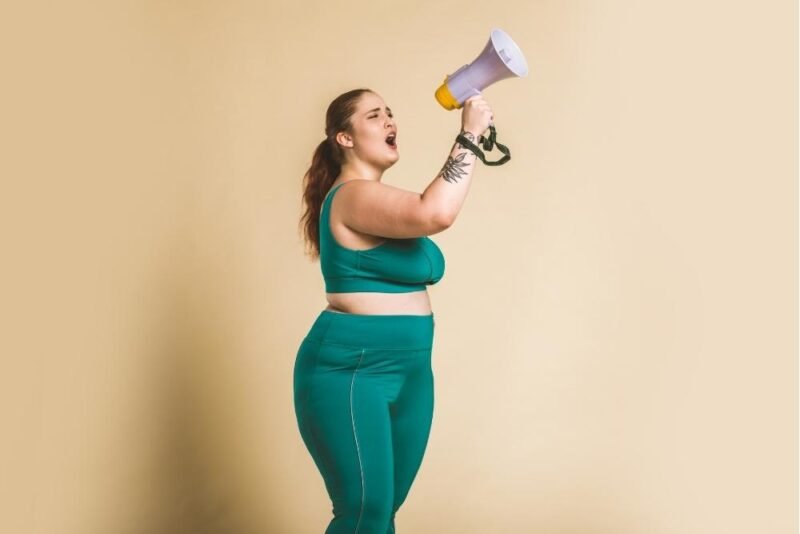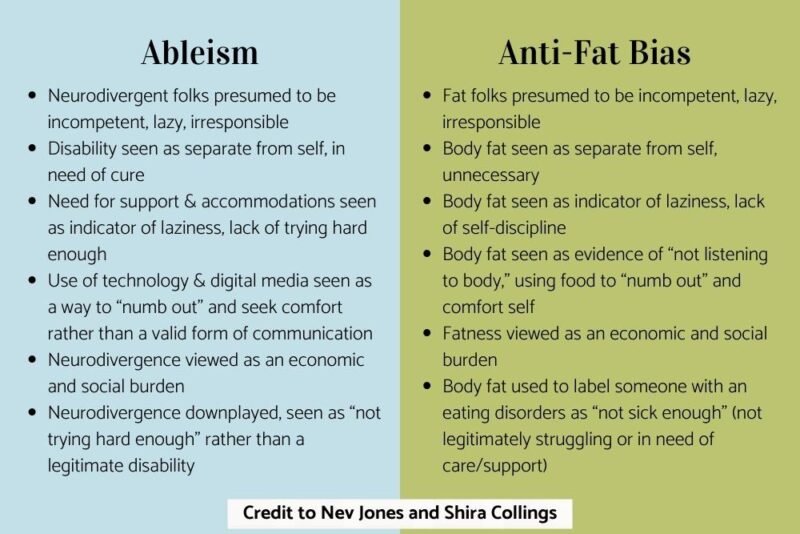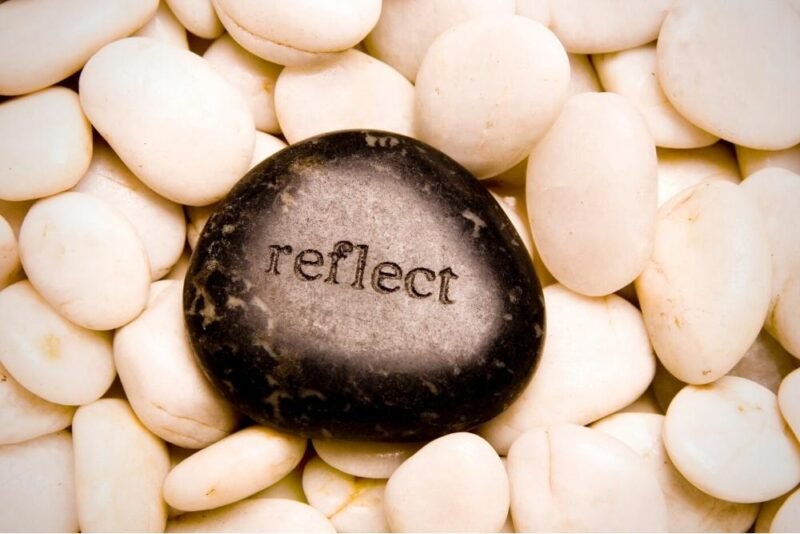The intersections of diet culture, ableism, healthism and anti-fatness


The matter of this site write-up is a person I only commenced to examine myself in the previous calendar year or so. I was shocked, at first, when it sunk in how ableist diet regime lifestyle is, with healthism and anti-fatness/sizeism as the backlinks. I realized how ablest (and healthist) my possess considering was back when I was deeply enmeshed in food plan lifestyle, myself. And now that I see this darker aspect of diet regime tradition, I can’t unsee it, and I want you to see it, also.
Eating plan tradition is just one of a lot of social units in which folks are addressed inequitably. It normally overlaps not just with ableism, sizeism and healthism, but also with racism, sexism, ageism and classism.
Diet plan lifestyle supports interpretations of personal health and fitness choices as ethical character — it’s not just about bodyweight reduction. Food plan tradition does not support the price of all bodies, and diet plan society does not exist in a vacuum.
Even if you really don’t look at your self to be on a “diet,” mainly because you live inside diet regime tradition, you will still have views, beliefs and behaviors — mindful or unconscious — that have been strongly motivated by food plan society. Unless you do the work to free on your own, of training course.
Closely connected to diet plan tradition is exercise tradition, which, not amazingly, is also healthist and ableist, sending delicate or not-so-subtle messages that training should really be applied to “overcome” or stay away from incapacity, mainly because disabled bodies have significantly less price.

What is “disability”? What is “ableism”?
So, what do I imply when I say “disabled”? I’m not only talking about needing to use a wheelchair, a walker, a cane or other mobility aid products. Disabilities can be seen, or not visible. Someone with a well being issue that impacts their energy, stamina or mobility would be disabled, and that could not be totally noticeable. Or, an individual could be neurodivergent, which normally is invisible.
“Neurodivergent” is expression for individuals with cognitive and/or neurological processes that vary from what is thought of — by cultural/societal and medical benchmarks — to be “typical” or “normal.” This features people today with autism, ADHD, anxiousness, depression and borderline personality, as properly as people who are hugely sensitive to sensory stimulation.
I found this definition by law firm and social justice activist Talila “TL” Lewis to be thorough and strong:
“A process of assigning worth to people’s bodies and minds dependent on societally manufactured suggestions of normalcy, productiveness, desirability, intelligence, excellence, and physical fitness. These produced suggestions are deeply rooted in eugenics, anti-Blackness, misogyny, colonialism, imperialism and capitalism.
“This systemic oppression leads to people today and culture determining people’s value dependent on their lifestyle, age, language, visual appeal, religion, start or dwelling location, “health/wellness,” and/or their ability to satisfactorily re/deliver, “excel” and ‘behave.’
“You do not have to be disabled to knowledge ableism.”
What ablism and anti-fatness/sizeism have in typical is the ideal — held by the medical system and culture at substantial — that getting unwanted fat and remaining disabled are both abnormalities that the person should do the job tough to overcome. Also, that owning a entire body that is irregular in this way means that you are not typical, and not pretty human. [Note that I use the word “fat” as a neutral descriptor, like short or tall.]
Which is full and utter bullsh*t.

A initial glance at ableism and anti-fats bias
Just as you really don’t have to be disabled to encounter ableism, you really do not have to be excess fat to experience anti-fats bias. If you are a thin particular person who diet programs or workout routines to remain slim, it’s at minimum in component for the reason that you are scared of getting to be excess fat. It may possibly also due to the fact you are worried of turning out to be “unhealthy” or going through a reduction of mobility.
I have had purchasers in larger sized bodies who also materialize to have some mobility troubles convey to me how vital it was for them to attempt to stroll or shift “normally.” This is a lot less about how motion feels in their physique, and a lot more about how they might be judged by other if they are extra fat AND they walk little by little. I have also experienced neurodivergent customers in bigger bodies experience improved strain to mask signals of their neurodivergence.
Systemic oppression primarily based on whether a person adheres to societal ideals of “normalcy” and “intelligence” impacts disabled and neurodivergent persons, as effectively as extra fat folks. This can include:
- Concentrating on reducing “symptoms” of neurodivergence — or on losing fat — as a result of diet interventions.
- Seeing neurodivergence — or “excess” entire body extra fat — as a thing to “cure.”
- Focusing only on how neurodivergent and excess fat people can cope in an ableist/anti-body fat earth rather of concentrating on earning the earth extra available and friendly to a various vary of individuals.
On that past stage, folks dwelling in excess fat bodies may perhaps have issues finding captivating clothes (or any clothes that are not custom made-created) that suit. They could dread heading to dining establishments, theaters or on airplanes for the reason that they know (or aren’t guaranteed) if the chairs or seat will accommodate their bodies. Persons dwelling with a actual physical disability may possibly also have hassle finding apparel and seats (or full buildings) that are designed to fulfill their requires.

How healthism performs a connecting job
Healthism is a philosophy that overemphasizes person duty in overall health results and prioritizes pursuing wellness over all else. This can incorporate:
- Demonizing eating for satisfaction, joy, ease and comfort, or stimulation. (There really should be no disgrace in locating pleasure/joy/comfort and ease from food, and food can be an significant variety of stimulation, or stimming, for some neurodivergent individuals.)
- Shaming individuals for picking out ease foods, despite the fact these foodstuff might be pleasing, and may perhaps be a preserving grace for busy individuals as perfectly as persons who uncover it challenging mentally or physically to prepare dinner a meal “from scratch.”
- Seeing wellbeing (and the pursuit of wellbeing) as a ethical obligation.
I have a good deal to say on that very last place, but let us commence by pointing out what may possibly be noticeable: Several people are (reluctantly) inclined to give excess fat folks a go “as long as they’re healthy.” This is part of the “good fatty” trope — be active, beautiful and successful, and don’t settle for your current human body as Ok. (If you are excess fat and dare to like on your own, a person might accuse you of “glorifying weight problems.”
I’ve experienced a lot of clientele in larger bodies convey to me they sense they have to have to seem like they’re making an attempt to lose excess weight or “get healthy” — purchasing the salad, likely to the gym, bragging about their outstanding cholesterol and blood sugar ranges — even when they are in the method of unsubscribing from eating plan society and earning peace with food and their bodies.
When another person “concern trolls” a unwanted fat particular person on social media (or elsewhere), what do they say? Normally anything like, “but you are not healthy” or “you’re going to get diabetes.” Yep, ableism (and healthism) are inherently baked into anti-fatness.
Although it is genuine that fat and health and fitness are not intently linked (affiliation does not verify causation), I have arrive to comply with statements I make about that point with yet another statement that can be even intellect-blowing: getting balanced and/or pursuing health and fitness is not a moral very important.
Mic drop.

Well being isn’t a warranty, or a measure of worthiness
Fairly only, “health,” as it is generally described, is not a useful resource that is offered to every person. Some folks never have that resource. Other people today intermittently have it. Even now other folks have it for a when, then never have it, and hardly ever have it yet again.
Like it or not, if we are blessed sufficient to dwell extensive enough, issues are heading to come about to our bodies. We could possibly discover that our joints ache, that we acquire bodyweight, that our blood pressure developments larger, that we require to use a walker or a wheelchair, that we get most cancers. Our bodies are no considerably less deserving. We are no considerably less deserving.
When I was however undertaking “non-diet excess weight management” (which I ultimately recognized was not a matter) I would normally help clients set “meaningful” goals. In other phrases, instead of working with fitting into “skinny jeans” as a objective, we would use “keeping up with your kids” as a target. Yep, that is absolutely ableist. Some parents will by no means be ready to “keep up with” their young ones or get down on the flooring to enjoy with their young children. That does not make them poor or ineffective dad and mom.
Unwanted fat people today and neurodivergent folks have normally existed, so alarmist headlines (and the general public overall health machinations powering them) about the “ob*sity epidemic” or the “autism epidemic” seriously spread the notion that everyone who diverges from what has been labeled “normal” should be eliminated or erased. We noticed this evidently in 1 not-so-charming chapter of our country’s historical past concerned what had been known as “ugly legislation.”
From 1867 to the starting of Entire world War I, some U.S. towns enacted so-called “ugly laws” banning persons considered “diseased, maimed, mutilated or in any way deformed so as to be an unsightly or disgusting object or poor person” from community spaces. While these laws turned much less enforced around time, Chicago did not repeal its “ugly law” right up until 1974, when an alderman took up the induce, contacting the legislation “cruel and insensitive” and “a throwback to the Center Ages.”

A 2nd glimpse at ableism and anti-fatness
For this section, and the graphic higher than, I give weighty credit to psychological overall health researcher and professor Nev Jones and therapist Shira Collings, who gave a communicate alongside one another at an RDs for Neurodiversity meeting I attended earlier this calendar year.
They said the concept of “excess” is an underlying thread beneath anti-extra fat bias and ableism. Body excess fat/fatness is seen as excessive body tissue, and as a end result of extreme taking in. The information is also that the entire body alone is virtually “excess” – that overall body dimensions is unbiased of who we are. Same with neurodiversity – incapacity and disability lodging as an “excess,” accommodations as unnecessary.
The two extra fat and neurodivergent persons experience objectification and disempowerment, as they are not noticed as the professionals on their have desires. I think this is correct for persons who have other sorts of incapacity, as perfectly.
Jones and Collings pointed out that neither system fats or neurodivergence are issues that will need to be fixed or removed, and that our bodies are areas of our minds and ourselves.
- Our cognition (thinking) is motivated by our bodies, and bodyweight suppression can have a significant negative effect on our considering.
- When someone is within just their established position range—which may require staying fat—this is essential and in actuality vital to how they operate and who they are.
There’s some critical food stuff for thought there.

So now what? Strategies to reflect
Did this publish really feel like a great deal? If it did, that is Ok. I hope it opens a doorway to checking out your individual feelings, thoughts, beliefs and assumptions about what bodies (and minds) are worthy and precious. Here are some queries to get you wondering:
- What methods of staying various get labeled as “bad” or “inferior” in our culture? Do you agree or disagree with these labels?
- In what strategies do you label other individuals as remaining a lot less worthy? Do you really feel like you do this consciously, or unconsciously (like probably you absorbed these concepts from culture but haven’t truly examined or questioned them)? How are these people unique from you? Do you see any fear that you could sometime be like these men and women?
- Should folks have to adjust their bodies or minds to “fit in,” or should really our modern society and its techniques evolve to be far more inclusive of all types of people?
- Do you judge (consciously or unconsciously) people who are “unhealthy”? Do you make a difference between getting a disease or disability that is “preventable” vs. one particular that’s not? Why?
- Do you believe it is a moral critical to go after wellness? Why or why not? If you do, how does this align (or conflict) with other beliefs you have about system autonomy?
- Do you think that we have personalized regulate around our well being? If sure, can you think of any or examples where by that is not the case?
- If you know that you choose persons dependent on their sizing, ability, health and fitness or other variables, how does that make you sense? Have you been judged by other people (or oneself) centered on a little something about you which is diverse? How did that make you come to feel?
- Do you stand opposed to some types of oppression (say, racism) but locate that you allow other sorts of oppression slide by? Why?
Some of these inquiries may possibly reveal responses about by yourself that make you cringe. If so, that’s Ok. Solution them with curiosity and self-compassion, and if you uncover that you have some beliefs or mindsets that need to have to change, then get started to adjust them. If we aren’t knowledgeable of our thoughts, thoughts, beliefs and behaviors, then we stay stuck. Recognition (again, paired with curiosity and self-compassion) opens the door to knowing superior, and undertaking improved.
Carrie Dennett, MPH, RDN, is a Pacific Northwest-based registered dietitian nutritionist, freelance writer, intuitive consuming counselor, author, and speaker. Her superpowers incorporate busting diet myths and empowering ladies to come to feel better in their bodies and make food stuff possibilities that assist enjoyment, nourishment and wellness. This publish is for informational purposes only and does not constitute individualized nourishment or professional medical tips.
 Print This Write-up
Print This Write-up




